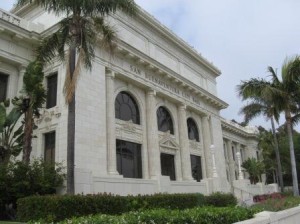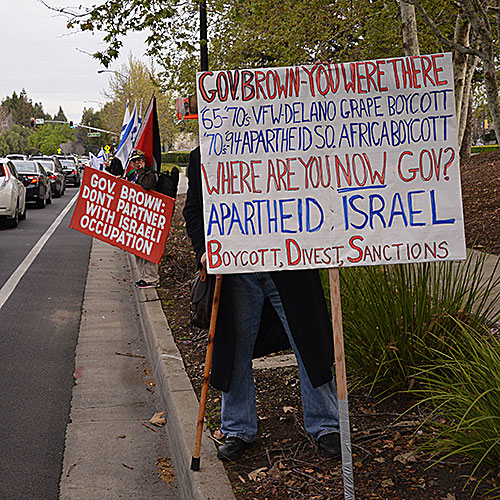Envtl. Prot. Agency v. EME Homer City Generation, L. P., United States Supreme Court (4/29/14)
Environmental Law, Government & Administrative Law
 The Clean Air Act (CAA) requires national ambient air quality standards (NAAQS) for pollutants at levels that will protect public health, 42 U.S.C. 7408. Once EPA establishes NAAQS, it designates “nonattainment” areas; each state must submit a State Implementation Plan, (SIP), within three years of any new or revised NAAQS. From the date EPA determines that a SIP is inadequate, EPA has two years to promulgate a Federal Implementation Plan (FIP). SIPs must comply with a Good Neighbor Provision, and “contain adequate provisions … prohibiting .. . any source or other type of emissions activity within the State from emitting any air pollutant in amounts which will … contribute significantly to nonattainment in, or interfere with maintenance by, any other State with respect to” NAAQS. In response to flaws in its 2005 Clean Air Interstate Rule, identified by the D. C. Circuit, EPA promulgated the Cross-State Air Pollution Rule (Transport Rule), curbing nitrogen oxide and sulfur dioxide emissions in 27 upwind states to achieve downwind attainment of three NAAQS and providing that an upwind state contributed significantly to downwind nonattainment if its exported pollution produced at least one percent of a NAAQS in a downwind state and could be eliminated cost-effectively. EPA created an annual emissions “budget” for each upwind state and contemporaneously promulgated FIPs allocating each state’s budget among its pollution sources. The D.C. Circuit vacated the rule as exceeding EPA’s authority. The Supreme Court reversed. The CAA does not require that states be given another opportunity to file a SIP after EPA has quantified interstate pollution obligations. Disapproval of a SIP, without more, triggers EPA’s obligation to issue a FIP within precise deadlines. That EPA had previously accorded upwind states a chance to allocate emission budgets among their sources does not show that it acted arbitrarily by refraining to do so in this instance. The Good Neighbor Provision does not dictate a method of apportionment, so EPA had authority to select from among reasonable options; nothing precludes the final calculation from relying on costs. By imposing uniform cost thresholds on regulated states, the rule is efficient and is stricter on states that have done less pollution control in the past and does not amount to “over-control.”
The Clean Air Act (CAA) requires national ambient air quality standards (NAAQS) for pollutants at levels that will protect public health, 42 U.S.C. 7408. Once EPA establishes NAAQS, it designates “nonattainment” areas; each state must submit a State Implementation Plan, (SIP), within three years of any new or revised NAAQS. From the date EPA determines that a SIP is inadequate, EPA has two years to promulgate a Federal Implementation Plan (FIP). SIPs must comply with a Good Neighbor Provision, and “contain adequate provisions … prohibiting .. . any source or other type of emissions activity within the State from emitting any air pollutant in amounts which will … contribute significantly to nonattainment in, or interfere with maintenance by, any other State with respect to” NAAQS. In response to flaws in its 2005 Clean Air Interstate Rule, identified by the D. C. Circuit, EPA promulgated the Cross-State Air Pollution Rule (Transport Rule), curbing nitrogen oxide and sulfur dioxide emissions in 27 upwind states to achieve downwind attainment of three NAAQS and providing that an upwind state contributed significantly to downwind nonattainment if its exported pollution produced at least one percent of a NAAQS in a downwind state and could be eliminated cost-effectively. EPA created an annual emissions “budget” for each upwind state and contemporaneously promulgated FIPs allocating each state’s budget among its pollution sources. The D.C. Circuit vacated the rule as exceeding EPA’s authority. The Supreme Court reversed. The CAA does not require that states be given another opportunity to file a SIP after EPA has quantified interstate pollution obligations. Disapproval of a SIP, without more, triggers EPA’s obligation to issue a FIP within precise deadlines. That EPA had previously accorded upwind states a chance to allocate emission budgets among their sources does not show that it acted arbitrarily by refraining to do so in this instance. The Good Neighbor Provision does not dictate a method of apportionment, so EPA had authority to select from among reasonable options; nothing precludes the final calculation from relying on costs. By imposing uniform cost thresholds on regulated states, the rule is efficient and is stricter on states that have done less pollution control in the past and does not amount to “over-control.”
Read More: Justices Back Rule Limiting Coal Pollution
Highmark, Inc. v. Allcare, United States Supreme Court (4/29/14)
Patents
The Patent Act provides: “The court in exceptional cases may award reasonable attorney fees to the prevailing party,” 35 U.S.C. 285. The Federal Circuit has interpreted section 285 as authorizing fee awards only “when there has been some material inappropriate conduct,” or when it is both “brought in subjective bad faith” and “objectively baseless.” A health insurance company obtained a declaratory judgment that a patent was invalid and not infringed. The district court found the case “exceptional” and awarded attorney fees of $4,694,727.40, $209,626.56 in expenses, and $375,400.05 in expert fees. The court found a pattern of “vexatious” and “deceitful” conduct by the defendant in attempting to force other companies to purchase licenses, even after its own experts determined that its claims lacked merit. The Federal Circuit reviewed the determination de novo and reversed in part. A unanimous Supreme Court vacated. All aspects of a district court’s exceptional-case determination should be reviewed for abuse of discretion. That determination is based on statutory text that emphasizes that the district court is better positioned to make the “multifarious and novel” determination, which is not susceptible to “useful generalization” of the sort that de novo review provides, and is “likely to profit from the experience that an abuse-of discretion rule will permit to develop.” The word “exceptional” should be given its ordinary meaning: “one that stands out from others with respect to the substantive strength of a party’s litigating position (considering both the governing law and the facts of the case) or the unreasonable manner in which the case was litigated,” considering the totality of the circumstances.
Octane Fitness, LLC v. ICON Health & Fitness, Inc., United States Supreme Court (4/29/14)
Patents
The Patent Act authorizes district courts to award attorney’s fees to prevailing parties in “exceptional cases,” 35 U.S.C. 285. In Brooks Furniture, the Federal Circuit defined an “exceptional case” as one which either involves “material inappropriate conduct” or is both “objectively baseless” and “brought in subjective bad faith” as shown by clear and convincing evidence. ICON sued Octane for patent infringement. The district court granted summary judgment to Octane, but denied attorney’s fees under section 285. The Federal Circuit affirmed. The Supreme Court reversed, finding the Brooks Furniture framework “unduly rigid’ in light of the statutory grant of discretion to district courts. Section 285 imposes only one constraint on the award of attorney’s fees, limiting it to “exceptional” cases. Because the Patent Act does not define “exceptional,” the term should be given it ordinary meaning: “uncommon,” “rare,” or “not ordinary.” An “exceptional” case is simply one that stands out from others with respect to the substantive strength of a party’s litigating position (considering both governing law and the facts) or the unreasonable manner in which the case was litigated. District courts may determine whether a case is “exceptional” in the case-by-case exercise of their discretion, considering the totality of the circumstances. The Brooks Furniture standard was so demanding that it appeared to render section 285 superfluous of the courts’ inherent power to award fees in cases involving misconduct or bad faith. Section 285 imposes no specific evidentiary burden.
Read More About These Two Decisions: Watch Out Trolls: Supreme Court Expands Fee Shifting in Patent Cases

 Courthouse News Service
Courthouse News Service  The Federal Election Campaign Act of 1971 and the Bipartisan Campaign Reform Act of 2002, impose base limits, restricting how much money a donor may contribute to a particular candidate or committee, and aggregate limits, restricting how much money a donor may contribute in total to all candidates or committees, 2 U.S.C. 441a. In the 2011–2012 election cycle, McCutcheon contributed to 16 federal candidates, complying with all base limits. He alleges that the aggregate limits prevented him from contributing to additional candidates and political committees and that he wishes to make similar contributions in the future. McCutcheon and the Republican National Committee challenged the aggregate limits under the First Amendment. The district court dismissed. The Supreme Court reversed, with five justices concluding that those limits are invalid. Regardless whether strict scrutiny or the “closely drawn” test applies, the analysis depends on the fit between stated governmental objectives and the means selected to achieve the objectives. The aggregate limits fail even under the “closely drawn” test. Contributing to a candidate is an exercise of the right to participate in the electoral process through political expression and political association. A restriction on how many candidates and committees an individual may support is not a “modest restraint.” To require a person to contribute at lower levels because he wants to support more candidates or causes penalizes that individual for “robustly exercis[ing]” his First Amendment rights. The proper focus is on an individual’s right to engage in political speech, not a collective conception of the public good. The aggregate limits do not further the permissible governmental interest in preventing quid pro quo corruption or its appearance. The justices noted the line between quid pro quo corruption and general influence and that the Court must “err on the side of protecting political speech.” Given regulations already in effect, fear that an individual might make massive unearmarked contributions to entities likely to support particular candidate is speculative. Experience suggests that most contributions are retained and spent by their recipients; the government provided no reason to believe that candidates or committees would dramatically shift their priorities if aggregate limits were lifted. Multiple alternatives could serve the interest in preventing circumvention without “unnecessary abridgment” of First Amendment rights, such as targeted restrictions on transfers among candidates and committees, tighter earmarking rules, and disclosure.
The Federal Election Campaign Act of 1971 and the Bipartisan Campaign Reform Act of 2002, impose base limits, restricting how much money a donor may contribute to a particular candidate or committee, and aggregate limits, restricting how much money a donor may contribute in total to all candidates or committees, 2 U.S.C. 441a. In the 2011–2012 election cycle, McCutcheon contributed to 16 federal candidates, complying with all base limits. He alleges that the aggregate limits prevented him from contributing to additional candidates and political committees and that he wishes to make similar contributions in the future. McCutcheon and the Republican National Committee challenged the aggregate limits under the First Amendment. The district court dismissed. The Supreme Court reversed, with five justices concluding that those limits are invalid. Regardless whether strict scrutiny or the “closely drawn” test applies, the analysis depends on the fit between stated governmental objectives and the means selected to achieve the objectives. The aggregate limits fail even under the “closely drawn” test. Contributing to a candidate is an exercise of the right to participate in the electoral process through political expression and political association. A restriction on how many candidates and committees an individual may support is not a “modest restraint.” To require a person to contribute at lower levels because he wants to support more candidates or causes penalizes that individual for “robustly exercis[ing]” his First Amendment rights. The proper focus is on an individual’s right to engage in political speech, not a collective conception of the public good. The aggregate limits do not further the permissible governmental interest in preventing quid pro quo corruption or its appearance. The justices noted the line between quid pro quo corruption and general influence and that the Court must “err on the side of protecting political speech.” Given regulations already in effect, fear that an individual might make massive unearmarked contributions to entities likely to support particular candidate is speculative. Experience suggests that most contributions are retained and spent by their recipients; the government provided no reason to believe that candidates or committees would dramatically shift their priorities if aggregate limits were lifted. Multiple alternatives could serve the interest in preventing circumvention without “unnecessary abridgment” of First Amendment rights, such as targeted restrictions on transfers among candidates and committees, tighter earmarking rules, and disclosure. Defendant-appellant Gwen Bergman was arrested when the hit-man she thought she hired to kill her husband was in fact an undercover police officer. After trial, it emerged that defendant’s lawyer was not a lawyer-in-fact, but a con man. Defendant applied for habeas relief on the ground that she received ineffective assistance of counsel. The district court agreed with her: the court vacated her conviction, and discharged her from supervised release (she had finished her prison term). Assuming the court’s decision to vacate the conviction it won at defendant’s first trial was without prejudice to a new trial with a (real) defense lawyer, the government asked the court to set a date. The district court refused, stating that its discharge order “implicitly” forbade any effort to secure a valid conviction at a second trial. The government appealed the district court’s decision to the Tenth Circuit. The government’s appeal raised the question of whether defendant could be exposed to a new trial and lawful conviction despite having successfully petitioned for habeas relief and served her jail sentence. Rather than contend categorically that only double jeopardy problems may preclude retrial, the government suggested that the remedy the district court selected was too attenuated from the right it found violated: defendant’s Sixth Amendment right to effective assistance of counsel. “[T]he presumptively appropriate remedy for a trial with an ineffective lawyer is a new trial with an effective one. . . . the district court failed to identify any reason why that presumption is inapplicable here; and in these circumstances refusing a new trial amounts to an abuse of discretion.”
Defendant-appellant Gwen Bergman was arrested when the hit-man she thought she hired to kill her husband was in fact an undercover police officer. After trial, it emerged that defendant’s lawyer was not a lawyer-in-fact, but a con man. Defendant applied for habeas relief on the ground that she received ineffective assistance of counsel. The district court agreed with her: the court vacated her conviction, and discharged her from supervised release (she had finished her prison term). Assuming the court’s decision to vacate the conviction it won at defendant’s first trial was without prejudice to a new trial with a (real) defense lawyer, the government asked the court to set a date. The district court refused, stating that its discharge order “implicitly” forbade any effort to secure a valid conviction at a second trial. The government appealed the district court’s decision to the Tenth Circuit. The government’s appeal raised the question of whether defendant could be exposed to a new trial and lawful conviction despite having successfully petitioned for habeas relief and served her jail sentence. Rather than contend categorically that only double jeopardy problems may preclude retrial, the government suggested that the remedy the district court selected was too attenuated from the right it found violated: defendant’s Sixth Amendment right to effective assistance of counsel. “[T]he presumptively appropriate remedy for a trial with an ineffective lawyer is a new trial with an effective one. . . . the district court failed to identify any reason why that presumption is inapplicable here; and in these circumstances refusing a new trial amounts to an abuse of discretion.” The General Railroad Right-of-Way Act of 1875 provides railroad companies “right[s] of way through the public lands of the United States,” 43 U.S.C. 934. One such right of way, created in 1908, crosses land that the government conveyed to the Brandt family in a 1976 land patent. That patent stated that the land was granted subject to the right of way, but it did not specify what would occur if the railroad relinquished those rights. A successor railroad abandoned the right of way with federal approval. The government sought a declaration of abandonment and an order quieting its title to the abandoned right of way, including the stretch across the Brandt patent. Brandt argued that the right of way was a mere easement that was extinguished upon abandonment. The district court quieted title in the government. The Tenth Circuit affirmed. The Supreme Court reversed. The right of way was an easement that was terminated by abandonment, leaving Brandt’s land unburdened. The Court noted that that the government had argued the opposite position in an earlier case. In that case, the Court found the 1875 Act’s text “wholly inconsistent” with the grant of a fee interest. An easement disappears when abandoned by its beneficiary.
The General Railroad Right-of-Way Act of 1875 provides railroad companies “right[s] of way through the public lands of the United States,” 43 U.S.C. 934. One such right of way, created in 1908, crosses land that the government conveyed to the Brandt family in a 1976 land patent. That patent stated that the land was granted subject to the right of way, but it did not specify what would occur if the railroad relinquished those rights. A successor railroad abandoned the right of way with federal approval. The government sought a declaration of abandonment and an order quieting its title to the abandoned right of way, including the stretch across the Brandt patent. Brandt argued that the right of way was a mere easement that was extinguished upon abandonment. The district court quieted title in the government. The Tenth Circuit affirmed. The Supreme Court reversed. The right of way was an easement that was terminated by abandonment, leaving Brandt’s land unburdened. The Court noted that that the government had argued the opposite position in an earlier case. In that case, the Court found the 1875 Act’s text “wholly inconsistent” with the grant of a fee interest. An easement disappears when abandoned by its beneficiary. Delaware Courts of Chancery appealed to the U.S. Supreme Court recently, seeking to validate a law that would allow them to hold confidential arbitration proceedings for parties with $1M litigation at stake.
Delaware Courts of Chancery appealed to the U.S. Supreme Court recently, seeking to validate a law that would allow them to hold confidential arbitration proceedings for parties with $1M litigation at stake. 
